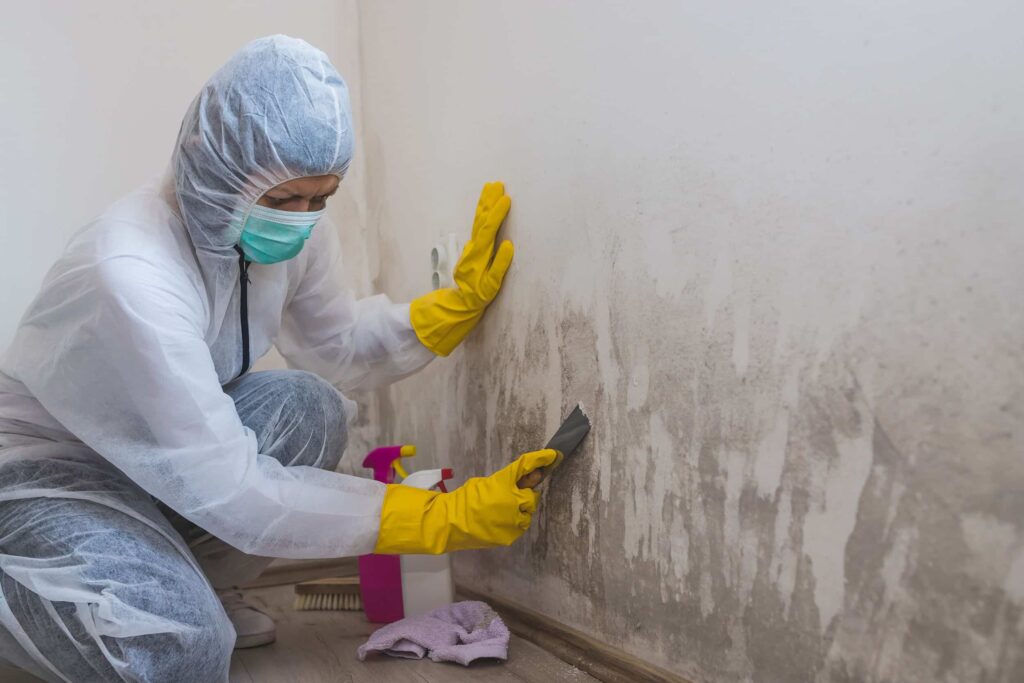Mold Testing Services Houston TX Mold testing is essential for identifying potential health hazards, determining the type of mold present, and guiding effective remediation efforts.

Here’s a detailed overview of what mold testing in Conroe typically entails:
- Initial Assessment and Inspection:
- The process begins with an initial assessment and inspection of the property by a certified mold inspector. They will visually inspect the interior and exterior of the building, looking for signs of water damage, moisture intrusion, and mold growth.
- Special attention is paid to areas prone to moisture accumulation, such as basements, crawl spaces, attics, bathrooms, kitchens, and around windows and doors.
- The inspector may use moisture meters, thermal imaging cameras, and other specialized tools to detect hidden moisture and potential mold growth behind walls, ceilings, and flooring.
- Air Sampling:
- Air sampling is a common method used in mold testing to assess the indoor air quality and determine the concentration of mold spores present.
- During air sampling, air samples are collected from different areas of the property using specialized equipment such as air pumps and spore traps.
- Samples may be collected both indoors and outdoors to establish a baseline for comparison. Outdoor air samples help identify the natural levels of mold spores in the environment.
- The collected air samples are then sent to a certified laboratory for analysis, where they are examined under a microscope to identify and quantify the types and concentrations of mold spores present.
- Surface Sampling:
- Surface sampling involves collecting samples from visible mold growth or suspected mold contamination on surfaces such as walls, ceilings, floors, and furnishings.
- Samples may be collected using swabs, tape lifts, or bulk sampling methods, depending on the nature of the surface and the extent of mold growth.
- Surface samples are also sent to a laboratory for analysis, where they are examined to identify the types of mold present and assess the severity of contamination.
- Moisture Mapping and Moisture Testing:
- Moisture mapping involves using moisture meters and infrared cameras to identify areas of elevated moisture levels within the building.
- Moisture testing helps pinpoint the source of moisture intrusion, such as plumbing leaks, roof leaks, or improper ventilation, which can contribute to mold growth.
- Addressing moisture issues is crucial for preventing mold growth and ensuring effective remediation.
- Lab Analysis and Reporting:
- Once the air and surface samples are collected, they are sent to a certified laboratory for analysis by trained microbiologists.
- The laboratory provides detailed reports outlining the types and concentrations of mold spores identified in the samples.
- The mold testing report also includes recommendations for remediation based on the findings, including the extent of contamination, areas requiring cleanup, and preventive measures to mitigate future mold growth.
- Interpretation and Recommendations:
- A qualified mold inspector interprets the laboratory results and provides recommendations for remediation based on industry best practices and guidelines.
- Recommendations may include the removal of contaminated materials, thorough cleaning and disinfection of affected areas, improving ventilation and moisture control, and implementing preventive measures to reduce the risk of future mold growth.
- The inspector works closely with property owners or managers to develop a customized remediation plan tailored to the specific needs of the property.
- Post-Remediation Verification:
- After remediation efforts are completed, post-remediation verification may be conducted to ensure that mold levels have been effectively reduced to acceptable levels.
- Additional air and surface samples may be collected to confirm the success of remediation efforts and ensure that the property is safe for occupancy.
- Post-remediation verification provides peace of mind to property owners and occupants that the mold problem has been addressed effectively.
Mold Testing Services Houston TX By following industry best practices and guidelines, mold testing professionals help property owners identify and address mold issues effectively, ensuring a safe and healthy indoor environment.
Mold Testing Houston
5926 Dellfern Dr, Houston, TX 77035, United States
1-832-409-2125
